Vehicle tax renewal is one of the most essential responsibilities for any driver in the United Kingdom. Often referred to as road tax or car tax, this process is regulated by the Driver and Vehicle Licensing Agency (DVLA) and ensures that all vehicles driven on public roads are properly taxed according to their emissions, value, and type.
Failing to renew vehicle tax on time can lead to steep penalties, enforcement actions, and even legal prosecution. In today’s digital-first landscape, the government has introduced various methods to make renewal easier ranging from online tools to Post Office services and automated phone systems.
This complete guide explores how vehicle tax renewal works, who it applies to, how to avoid common pitfalls, and what you need to stay compliant.
What is Vehicle Tax Renewal and Why is It Important in the Uk?
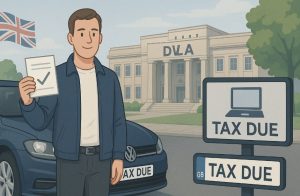
Vehicle Excise Duty (VED)
Vehicle tax, officially called Vehicle Excise Duty (VED), is a mandatory charge for most vehicles that use UK roads. It is payable annually or in smaller instalments and is based primarily on the vehicle’s CO₂ emissions and engine type.
The amount of tax you pay depends on the year the vehicle was registered, the fuel type, and its emissions category. Vehicles registered after April 1, 2017, are subject to a different rate structure than older models.
Why Vehicle Tax Renewal Is Crucial?
Renewing vehicle tax is not optional. it is a legal obligation. Unpaid or expired tax can result in the DVLA issuing fines or even clamping your vehicle without prior notice. The tax system also contributes significantly to the UK’s transport infrastructure budget, helping to fund road maintenance, highway development, and emissions control initiatives.
Moreover, road tax functions as a regulatory tool, encouraging the purchase and use of low-emission vehicles. This aligns with the UK government’s wider environmental policies aimed at reducing carbon emissions and achieving net-zero targets.
How Can You Check Your Vehicle Tax Status in the Uk?
The UK government offers a convenient, user-friendly tool for checking your vehicle’s tax and MOT status online. By visiting the GOV.UK check vehicle tax page, you can find out whether your vehicle is taxed, when it’s due, and whether it has a valid MOT.
To access the tool, you need the vehicle’s registration number. Once entered, the system will display your vehicle’s current tax status, SORN status (if applicable), and MOT expiry date. This helps ensure your vehicle remains road-legal and avoids penalties from driving with expired tax or MOT.
Checking your status is especially important before purchasing a second-hand vehicle, as you must re-tax the car immediately after the saleeven if it appears to be taxed under the previous owner.
What Are the Ways to Renew Vehicle Tax Online and Offline?
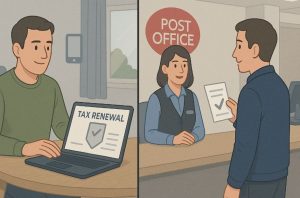
Online Renewal Through GOV.UK
The simplest way to renew your vehicle tax is online. The GOV.UK portal allows you to complete the entire process in minutes, with secure payment options and immediate confirmation. You’ll need a reference number found on either the V11 reminder letter, your vehicle’s V5C logbook, or the green slip (V5C/2) if the vehicle has recently changed hands.
Once you’ve entered the required information, you can pay by debit card, credit card, or set up a direct debit for automatic renewals. This method is highly recommended for its speed and reliability.
In-Person Renewal at the Post Office
Not all drivers are comfortable using online services. For those who prefer face-to-face interaction, selected Post Office branches offer vehicle tax renewal services. You’ll need to bring your V11 or V5C document, as well as a valid MOT certificate if applicable. Staff can help process your renewal and provide an official receipt.
Renewing by Phone
The DVLA also provides an automated telephone service available 24/7 for tax renewals. You’ll need to call 0300 123 4321 and have your V11 reference number and payment method ready. This is a useful alternative for drivers without internet access or those who prefer to speak with a system rather than navigate a website.
Can You Tax a Vehicle Without a Reminder Letter or Log Book (V5c)?
If you’ve misplaced your V11 reminder or V5C log book, you’re not alone. it’s a common issue. Fortunately, you can still renew your tax by using the V5C/2 slip if you recently purchased the vehicle, or by applying for a new log book using the V62 form.
Applying with a V62 Form
| Detail | Information |
| Form name | V62 |
| Submission fee | £25 |
| Processing time | Up to 6 weeks |
| Submission method | By post to DVLA, Swansea |
During this period, if your MOT and insurance are valid, and you have proof of ownership, you may still be able to tax the vehicle by contacting DVLA or visiting a Post Office.
What Are the Current Vehicle Tax Rates in the Uk for 2025?
Understanding Emission-Based Tax Bands
In 2025, vehicle tax is largely determined by the amount of CO₂ a vehicle emits, its fuel type, and the date it was registered. Vehicles that emit more pollutants pay higher rates, while electric vehicles and hybrids enjoy exemptions or discounts.
Current 2025 Vehicle Tax Rates (First Year)
| CO₂ Emissions (g/km) | First-Year Rate | Annual Standard Rate (Year 2+) |
| 0 | £0 | £0 (until 2026) |
| 1–50 | £10–£25 | £190 |
| 51–75 | £120 | £190 |
| 76–150 | £170 | £190 |
| 151–170 | £645 | £190 |
| 171–190 | £1,040 | £190 |
| 191–225 | £1,565 | £190 |
| 226–255 | £2,245 | £190 |
| Over 255 | £2,605 | £190 |
Premium Vehicle Surcharge
Vehicles with a list price over £40,000 are subject to an extra charge of £390 per year, applied from the second year through to the sixth year. This surcharge is waived for zero-emission vehicles until April 2026, when new legislation will apply taxation to electric cars as well.
What happens if your car tax renewal is late or missed?
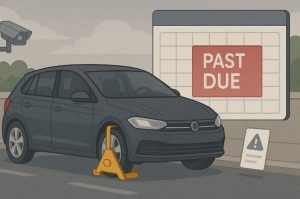
Penalties for Failing to Renew
Failing to renew your vehicle tax on time can lead to serious consequences. The DVLA uses an extensive network of ANPR (Automatic Number Plate Recognition) cameras to identify untaxed vehicles, and enforcement can begin the moment tax expires.
Types of Penalties
| Offence Type | Penalty |
| Unpaid tax (initial) | Fixed Penalty Notice – £80 fine |
| Late payment | Prosecution with fines up to £1,000 |
| Severe non-compliance | Clamping, towing, and impounding |
Unlike insurance or MOT where some tolerance may exist, vehicle tax has no grace period, so driving even one day after expiry puts you at legal risk.
Is your car MOT required before you can renew your vehicle tax?
MOT Is Essential for Tax Renewal
Vehicles over three years old must pass an MOT before tax can be renewed. The system cross-checks your MOT and insurance status during the renewal process to ensure roadworthiness and legal compliance.
Exceptions to the Rule
If the vehicle is less than three years old, it is not required to have an MOT. Vehicles under a Statutory Off-Road Notification (SORN) are also exempt from MOT until they are taxed and returned to road use.
Can You Pay Your Car Tax Monthly or by Direct Debit?
Payment Flexibility for Drivers
To ease financial planning, the DVLA offers multiple payment plans. You can choose to pay annually, every six months, or monthly by direct debit. Each comes with its own cost considerations.
Tax Payment Options and Costs
| Payment Method | Additional Charge | Comments |
| Annual | £0 | Cheapest overall |
| 6-Monthly | ~5% surcharge | Paid in two instalments |
| Monthly DD | ~5% surcharge | Most convenient but slightly costlier |
Direct debit is the preferred option for many as it ensures your tax is always up to date and renews automatically.
How does declaring a SORN affect vehicle tax renewal?

A Statutory Off-Road Notification (SORN) informs the DVLA that your vehicle is not being used or parked on public roads. This makes the vehicle exempt from tax and insurance for the duration it is off-road.
Renewing Tax After SORN
When you plan to use the vehicle again, you must:
- Ensure it has a valid MOT certificate
- Insure the vehicle
- Re-tax it via GOV.UK or at the Post Office
You cannot drive a vehicle under SORN unless it’s to a pre-booked MOT appointment.
How do you update your details for vehicle tax purposes?
Keeping Your Personal and Vehicle Details Accurate
Accurate personal and vehicle details are critical for staying compliant with UK vehicle tax laws. The DVLA uses your information on file such as your name, address, and vehicle details to send out important notifications, including the V11 tax reminder.
If you move house or change your name and fail to update your details, you risk not receiving this reminder, which could lead to an accidental lapse in your vehicle tax renewal.
Beyond reminders, outdated records may cause delays in tax refunds, fines for non-compliance, or enforcement actions. For example, enforcement letters may be sent to your old address, and you could miss out on warning notifications before DVLA clamps or impounds your vehicle.
How to Update Your Address or Name with the DVLA?
You can update your details in two main ways:
- Online via GOV.UK: The quickest and easiest method, especially for updating your address.
- By Post: Required for changes to your name or corrections to vehicle details on the V5C.
| Update Type | Method | Processing Time |
| Change of address | GOV.UK (online) or by post (V5C) | 5 working days (online) |
| Name change | Post (send updated V5C and proof) | 2–4 weeks |
| Vehicle details | Post with amended V5C | 2–4 weeks |
For all updates by post, send your documents to DVLA, Swansea, SA99 1BA. There’s no fee for making changes, and you’ll receive an updated V5C log book once processed.
What Are the Rules for Taxing a Vehicle if You’re Temporarily Abroad?
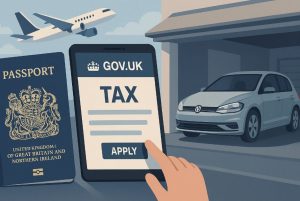
Vehicle Tax Requirements During Overseas Travel
UK residents who plan to travel or live abroad temporarily may wonder what happens to their vehicle tax obligations while they’re away. If the vehicle stays in the UK, it must either remain taxed or be officially declared off the road through a Statutory Off-Road Notification (SORN). If the vehicle travels with you and is registered abroad, it may no longer be eligible for UK vehicle tax.
Tax and SORN
The correct approach depends on the location and use of your vehicle during your time abroad:
| Situation | Recommended Action |
| Vehicle parked in UK off-road | Declare a SORN |
| Vehicle stored in UK garage | Declare a SORN |
| Vehicle taken abroad for long-term use | Export registration may be required |
| Returning to use vehicle in UK | Renew tax and MOT before driving |
A vehicle under SORN must not be driven or parked on a public road until it is properly taxed and insured again. SORN can be declared online, by phone, or by post using a V890 form.
Tips for Managing Vehicle Tax While Abroad
If you plan to return and drive your vehicle again, setting up a direct debit is a smart way to ensure your vehicle tax renews automatically, even while you’re overseas. You may also assign a trusted contact in the UK to receive correspondence from the DVLA, though they will not have authority to act on your behalf unless formally authorised.
For long absences, it’s advisable to keep a digital copy of your V5C and other vehicle documents in case updates or renewals are needed remotely.
Conclusion
Vehicle tax renewal is a vital aspect of responsible vehicle ownership in the UK. With the DVLA offering flexible renewal options, from online portals to Post Office and phone services, there’s no reason to fall behind.
By staying informed about rates, deadlines, and requirements, drivers can avoid penalties and help keep UK roads safe and sustainable. Whether you’re a new driver or a seasoned motorist, this guide gives you everything you need to stay on top of your vehicle tax in 2025 and beyond.
FAQs About Vehicle Tax Renewal in the UK
What happens if I drive without renewing my vehicle tax?
You could face fines up to £1,000, vehicle clamping, and even prosecution in severe cases.
Can I tax my car without an MOT?
Not unless it’s under three years old or declared off-road under SORN.
Do I need to tax a car I’ve just bought immediately?
Yes. Tax does not transfer from the previous owner. You must tax the vehicle before driving it.
Can I set up a direct debit to auto-renew tax?
Yes. The DVLA offers monthly, 6-monthly, and annual direct debit options through GOV.UK.
Are there exemptions for classic cars?
Vehicles over 40 years old are exempt from tax but must still be registered as such with the DVLA.
Is vehicle tax refunded if I sell the car?
Yes. You’ll automatically receive a refund for any full months remaining.
Will electric vehicles be taxed in the future?
Yes, from April 2026, electric vehicles will no longer be exempt from VED.








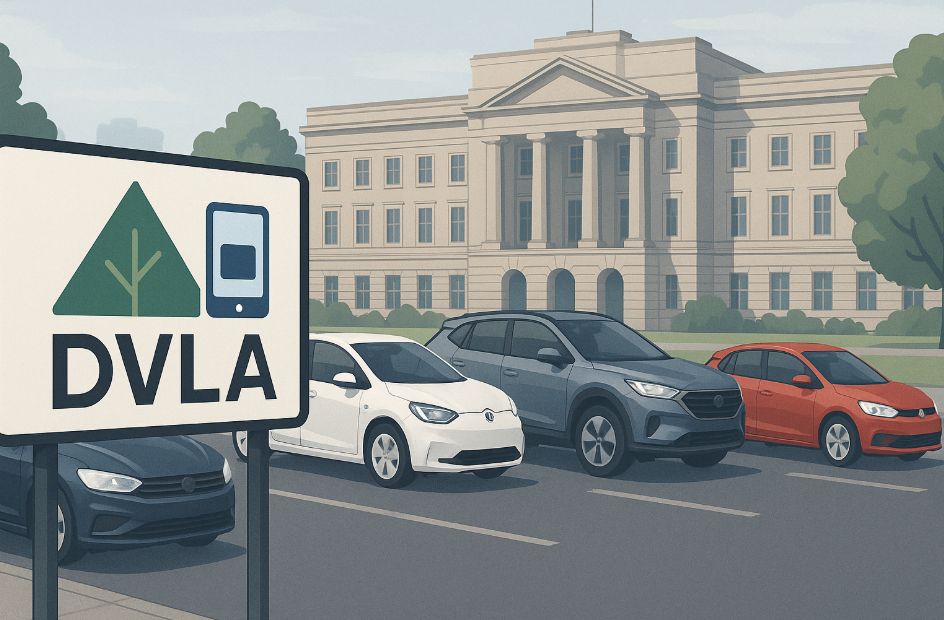
Leave feedback about this